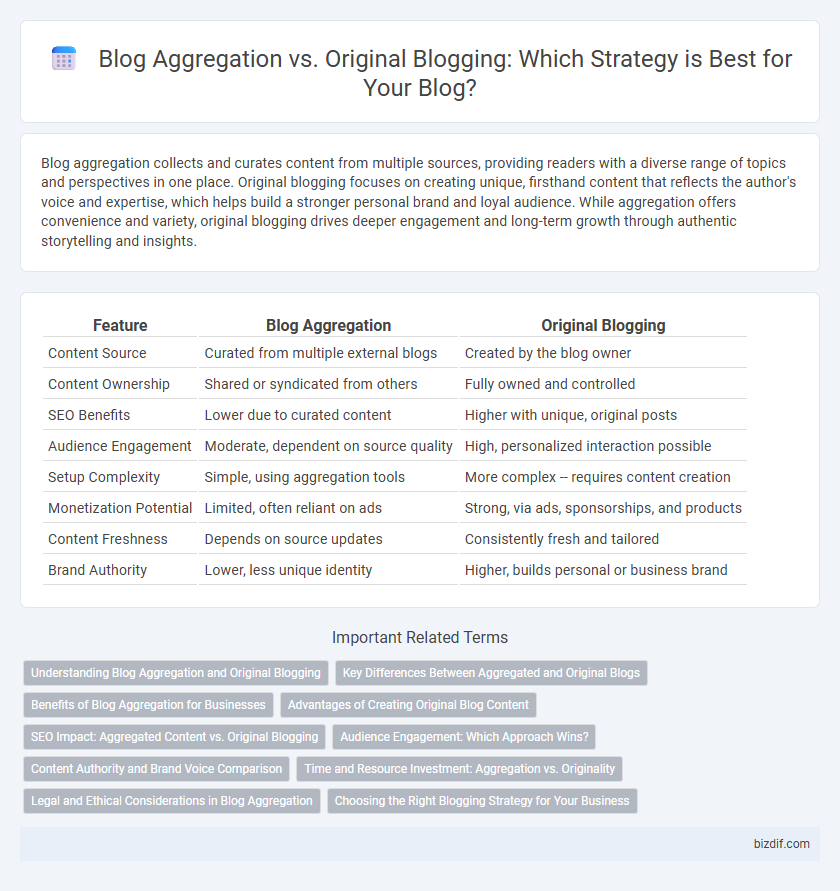Blog aggregation collects and curates content from multiple sources, providing readers with a diverse range of topics and perspectives in one place. Original blogging focuses on creating unique, firsthand content that reflects the author's voice and expertise, which helps build a stronger personal brand and loyal audience. While aggregation offers convenience and variety, original blogging drives deeper engagement and long-term growth through authentic storytelling and insights.
Table of Comparison
| Feature | Blog Aggregation | Original Blogging |
|---|---|---|
| Content Source | Curated from multiple external blogs | Created by the blog owner |
| Content Ownership | Shared or syndicated from others | Fully owned and controlled |
| SEO Benefits | Lower due to curated content | Higher with unique, original posts |
| Audience Engagement | Moderate, dependent on source quality | High, personalized interaction possible |
| Setup Complexity | Simple, using aggregation tools | More complex -- requires content creation |
| Monetization Potential | Limited, often reliant on ads | Strong, via ads, sponsorships, and products |
| Content Freshness | Depends on source updates | Consistently fresh and tailored |
| Brand Authority | Lower, less unique identity | Higher, builds personal or business brand |
Understanding Blog Aggregation and Original Blogging
Blog aggregation involves curating and compiling content from multiple sources into a centralized platform, enhancing content discovery and audience reach. Original blogging focuses on creating unique, authentic content that establishes personal voice and authority within a niche. Understanding these distinctions helps bloggers balance content strategy between aggregation for breadth and original blogging for depth and engagement.
Key Differences Between Aggregated and Original Blogs
Blog aggregation compiles and curates content from multiple sources, offering a broad overview but often lacking unique perspectives, while original blogging centers on creating exclusive, personalized content that reflects the author's voice and expertise. Aggregated blogs excel in providing quick access to diverse topics but may face challenges in SEO rankings due to duplicated content, whereas original blogs drive higher engagement and search traffic by delivering fresh, authoritative insights. The key differences lie in content ownership, depth of analysis, and the ability to build a loyal audience through authenticity and originality.
Benefits of Blog Aggregation for Businesses
Blog aggregation enables businesses to curate industry-relevant content efficiently, increasing website traffic and improving search engine rankings through diverse and consistent updates. It fosters brand authority by showcasing a wide array of expert perspectives while saving time and resources compared to producing original content. By leveraging aggregated blogs, businesses enhance audience engagement and drive targeted leads without the constant demand for fresh content creation.
Advantages of Creating Original Blog Content
Creating original blog content enhances search engine optimization (SEO) by providing unique keywords and fresh information that attracts higher-quality traffic. Original blogs establish authoritativeness and trustworthiness in a niche, fostering deeper reader engagement and brand loyalty. Unlike blog aggregation, original content offers exclusive insights and personalized perspectives, which drive increased social shares and long-term readership growth.
SEO Impact: Aggregated Content vs. Original Blogging
Original blogging enhances SEO by providing unique, valuable content that attracts organic traffic and earns higher rankings on search engines, whereas blog aggregation often results in duplicated content that can dilute SEO effectiveness and lower visibility. Search algorithms prioritize original content for user experience, making authentic posts crucial for establishing authority and generating backlinks. Consequently, investing in original blogging yields long-term SEO benefits compared to reliance on aggregated content.
Audience Engagement: Which Approach Wins?
Blog aggregation curates diverse content, appealing to audiences seeking variety and quick insights, often boosting site traffic through frequent updates. Original blogging builds deeper connections by offering unique perspectives and personalized storytelling, fostering loyal and engaged communities. For sustained audience engagement, original blogging typically outperforms aggregation by creating authentic value and encouraging meaningful interaction.
Content Authority and Brand Voice Comparison
Blog aggregation compiles external content, limiting opportunities to establish content authority and cultivate a unique brand voice. Original blogging delivers exclusive insights and authentic perspectives that enhance credibility and differentiate the brand within the niche. Consistent original content strengthens SEO rankings and fosters loyal audience engagement, crucial for long-term brand growth.
Time and Resource Investment: Aggregation vs. Originality
Blog aggregation requires significantly less time and resources than original blogging since it compiles existing content rather than creating new material. Original blogging demands substantial investment in research, writing, and multimedia production to develop unique and engaging posts. Efficient time management and resource allocation are crucial for bloggers aiming to balance content originality with consistent publishing schedules.
Legal and Ethical Considerations in Blog Aggregation
Blog aggregation involves curating content from multiple sources, raising legal concerns such as copyright infringement and the necessity for proper attribution to respect intellectual property rights. Ethically, aggregators must ensure transparency by clearly citing original authors to maintain trust and avoid plagiarism accusations. Compliance with fair use policies and obtaining permissions for content reproduction are critical to align blog aggregation practices with legal frameworks and ethical standards.
Choosing the Right Blogging Strategy for Your Business
Choosing between blog aggregation and original blogging depends on your business goals and target audience engagement. Original blogging establishes brand authority through unique, high-quality content, while blog aggregation curates relevant industry news to provide diverse perspectives and save content creation time. Evaluating factors like SEO impact, resource availability, and content control helps determine the most effective blogging strategy for growth and customer loyalty.
Blog Aggregation vs Original Blogging Infographic

 bizdif.com
bizdif.com